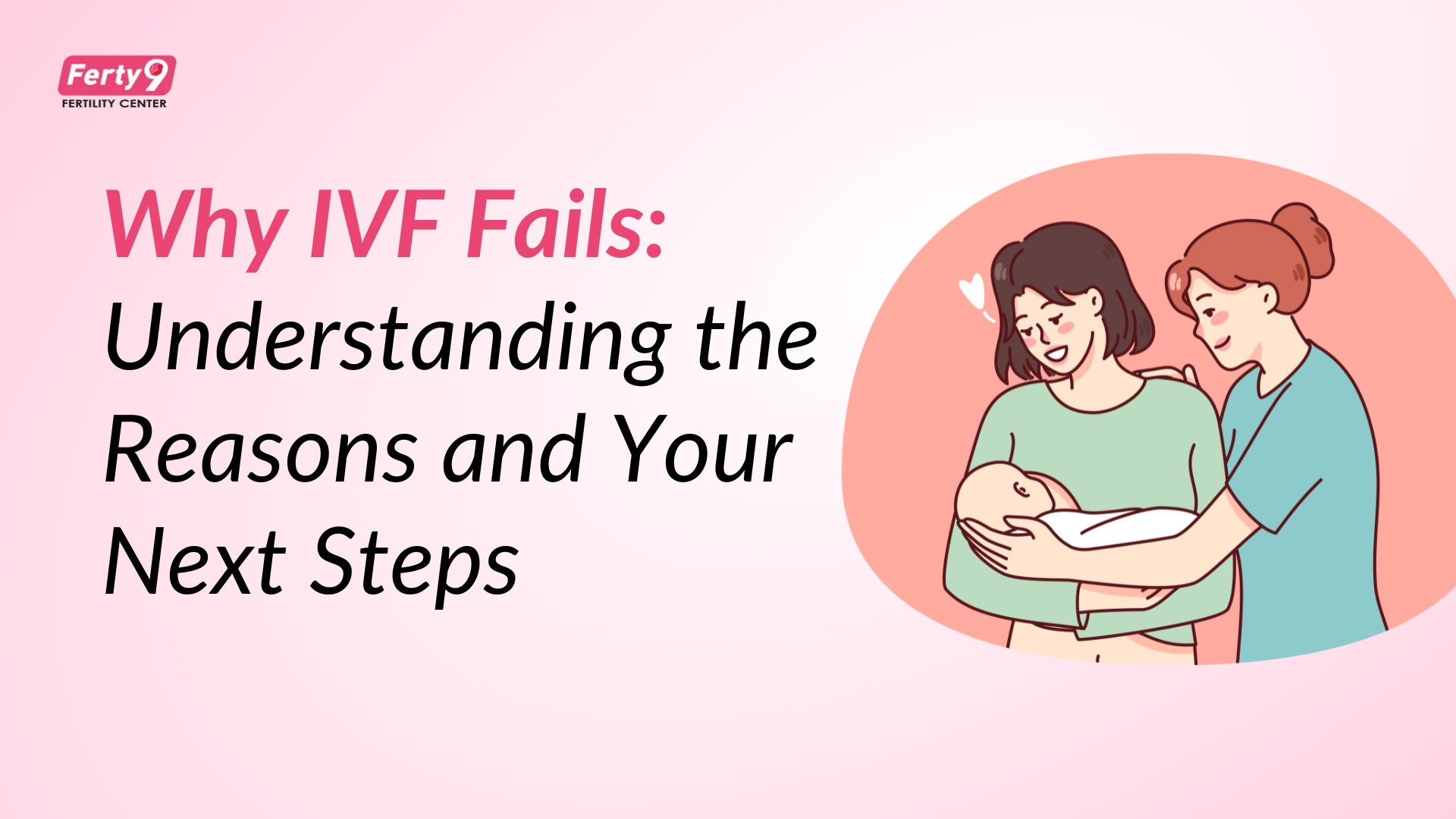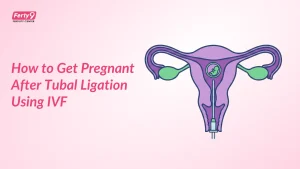IVF is a successful assisted reproductive technology, but it doesn’t guarantee success. There are times when it can fail. The factors responsible for IVF failure will be reviewed by fertility experts to overcome the challenges and improve the success rates. Here are some key factors and situations that can lead to IVF failure:
A. What factors are responsible for IVF failure?
1. Factors Related to Egg and Sperm
- Advanced Maternal Age: As women get older, their egg quality and quantity decline a lot, particularly after age 35. Older eggs often have chromosomal problems. This can lower fertilization rates, affect embryo quality, and decrease implantation rates.
- Poor egg quality: Younger women can still face issues. Factors like low ovarian reserve or other conditions may cause poor egg quality. This can affect fertilization and embryo development.
- Poor sperm quality: Low sperm count, poor motility, abnormal shape, or damaged DNA can affect fertilization and embryo development.
- Genetic issues: Problems with chromosomes in the egg or sperm can cause failed fertilization. They may also lead to poor embryo growth, failed implantation, or early miscarriage.
2. Factors Related to Embryo Development and Implantation
- Abnormal Embryo Development: Not all fertilized eggs develop into viable embryos. Some might stop growing or have genetic issues that make implantation or pregnancy difficult.
- Implantation Failure: A healthy embryo may fail to implant in the uterine lining due to various reasons, including:
- Uterine Abnormalities: Conditions such as fibroids, polyps, or adhesions can block implantation. A thin uterine lining may also cause issues.
- Hormonal Imbalances: Inadequate hormone levels can affect the receptivity of the uterine lining.
- Immunological Factors: Sometimes, the woman’s immune system may reject the embryo.
- Endometrial Receptivity: The uterus can only accept an embryo for a short time. If the embryo transfer does not coincide with this window, implantation may fail.
- Preimplantation genetic testing (PGT): It checks for certain chromosomal abnormalities. However, it cannot detect all possible problems. As a result, some issues may still lead to implantation failure or miscarriage.
3. Factors Related to Women’s Health and Lifestyle
- Uterine Issues: Abnormalities in the uterus can block implantation and prevent pregnancy.
- Polycystic Ovary Syndrome (PCOS): It causes a hormonal imbalance. This can lower egg quality, disrupt ovulation, and impact how the uterus receives an embryo.
- Lifestyle Factors: Smoking, drinking, obesity, being underweight, and poor diet can harm egg and sperm quality. They can also lower IVF success rates.
- Conditions that Affect Fertility: Thyroid imbalances, diabetes, autoimmune disorders, and infections can reduce fertility and impact IVF outcomes.
4. Factors Related to the IVF Procedure
- Poor Ovarian Response: Some women don’t make enough eggs during stimulation. This results in fewer eggs for fertilization.
- Laboratory Factors: Poor conditions in the IVF lab can harm egg, sperm, and embryo growth. Even small changes in temperature, pH, or air quality matter.
- Embryo Selection: Choosing the best embryo for transfer is very important. Embryologists evaluate embryo quality, but they can’t always find the ones with the best chance of implanting.
5. Other Factors
- Unexplained Infertility: IVF can fail at times, even when there is no known reason for infertility.
- Repeated Implantation Failure (RIF): It happens when pregnancy fails to occur after multiple IVF cycles, even with healthy embryos transferred. It can be due to a combination of the factors mentioned above, and further investigation is often needed.
- Emotional Stress: High stress and anxiety don’t directly cause IVF failure. But they can disrupt hormonal balance and affect overall well-being, which may impact outcomes.
A failed IVF cycle can cause significant emotional distress. However, it doesn’t mean future attempts will fail. A detailed review after a failed cycle can spot factors that may have contributed. This helps adjust the treatment plan and improve success in future cycles.
B. What measures does the doctor take if IVF fails?
It is natural for a failed IVF cycle to create emotional and physical challenges. Doctors carefully review what went wrong after an unsuccessful IVF. This helps them find reasons and improve the chances of success in future attempts. Here are the typical measures a doctor might take:
1. Detailed Review of the Previous Cycle:
- Analysis of Stimulation: The doctor will review how your ovaries responded to the medications. They will also check the number of eggs collected and matured.
- Fertilization Assessment: They will check the fertilization rate. This shows how many eggs were fertilized successfully with the sperm.
- Embryo Development: Reports from embryologists will be reviewed. They cover embryo quality, grading, and the stage of development at transfer. If time-lapse imaging is used, the patterns of embryo development would be reviewed.
- Embryo Transfer Details: Doctors check how easy the transfer is. They will see where the embryo goes in the uterus and look for any possible technical issues.
- Ovulatory Phase Support: Doctors check the type and length of progesterone support after the transfer.
2. Further Investigations and Testing
The doctor might suggest additional tests. This is based on the review of the last cycle and your medical history. These tests can help find any hidden problems. These can include:
- Hormonal Evaluation: Perform blood tests to evaluate hormone levels, including FSH, LH, estradiol, progesterone, thyroid hormones, and prolactin at various times in your cycle. This can help evaluate ovarian reserve, ovulation, and luteal phase adequacy.
Uterine Cavity Assessment
- Hysteroscopy: This is a simple procedure. A small camera goes into the uterus. This helps doctors see the uterine lining. They can spot issues like polyps, fibroids, and adhesions. These can sometimes be removed during the procedure.
- Saline Infusion Sonography (SIS) or Sonohysterography: Saline is instilled into the uterus during an ultrasound. This helps to see the uterine cavity clearly and find structural problems.
- Endometrial Receptivity Analysis (ERA): This test looks at gene expression in a small sample of the uterine lining. It helps to find the best time for embryo implantation.
- Immunological Testing: In cases of repeated implantation failure, you might test for autoimmune antibodies.
Genetic Testing
- Karyotyping and Sperm DNA Testing
- Identifies chromosomal issues in sperm and egg quality.
- Assesses sperm DNA fragmentation index (DFI).
- Screens the embryo for chromosomal abnormalities or specific genetic disorders before transfer.
- Checks for infections like endometritis that can hinder implantation.
Thrombophilia screening looks for blood clotting disorders that can be inherited or acquired. These disorders can impact implantation and early pregnancy.
3. Re-evaluation of the Treatment Plan
Based on the findings from the review and any additional tests, the doctor will work with you to adjust the treatment plan for future cycles. This might involve:
- Improving Egg Development in Ovarian Fertilization
- Changing the ovarian stimulation protocol.
- Utilizing adjuvant treatments, like medications or therapies.
- Using advanced sperm selection techniques, like ICSI or IMSI.
- Enhance embryo culture and selection by extending the culture to the blastocyst stage. Also, use time-lapse monitoring.
- Endometrial scratch.
- Adjusting luteal phase support by providing progesterone supplements.
4. Consideration of Alternative Options
If multiple IVF cycles have failed, the doctor may discuss alternative options such as:
- Donor eggs: Using eggs from a healthy donor who is younger significantly increases success rates. This is particularly helpful for older women or those with low egg quality.
- Donor Sperm: If there are severe issues in the male partner, this will be an option.
- Embryo Donation: Receiving embryos from another couple.
- Gestational Surrogacy: If there are uterine factors that prevent pregnancy.
5. Emotional Support and Counselling
Doctors know IVF failure can be tough. So, they often suggest counselling and support services. These resources help patients deal with disappointment and stress.




























